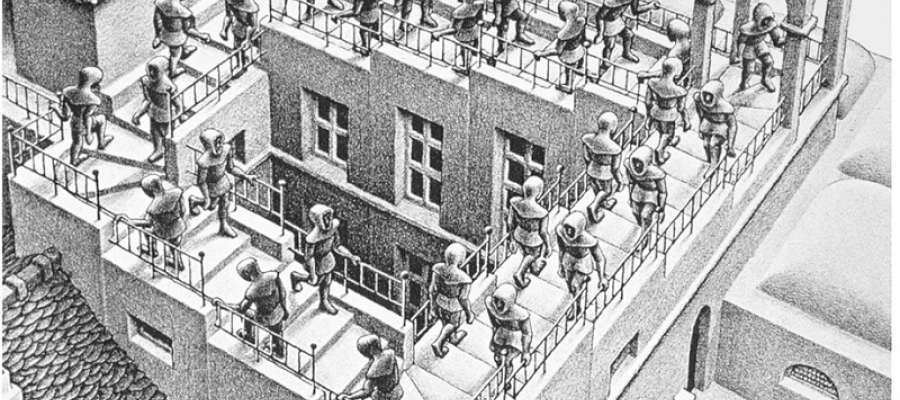Impossible Worlds
Dec 17, 2023Philosophers often speculate about possible worlds: ways that things could be. Some of them also believe in impossible worlds: ways that things couldn't be.

Philosophers talk a lot about possible worlds. Out there in the multiverse, maybe there’s a world where Josh teaches logic and Ray teaches Proust; that’s entirely imaginable. But could there somehow be an impossible world? One where Ray both does and does not teach Proust? That seems, well, impossible!
Possible worlds can, of course, violate the laws of physics and biology. We can easily imagine a world where Ray and Josh each have three heads. (I guess they’d need six microphones between them, but that could be arranged.) Maybe we can even imagine one where time travel exists. But a world in which Ray does and does not teach Proust is one that violates the laws of logic. And that seems like a much bigger problem.
Still, think about the fantastic M.C. Escher drawing you see above. It’s called Ascending and Descending, and it shows people going up and up on a staircase, but ending exactly where they started. We can easily imagine that world; in fact we’re looking at it right now!
Or again, consider philosopher Tamar Gendler’s ingenious story, “The Tower of Goldbach.” Here, mathematicians prove that every even number is the sum of two primes. (Four, for example, is the sum of one and three; twelve is the sum of five and seven.) This hubris makes God angry, and he punishes the mathematicians: henceforth twelve will no longer be the sum of five and seven. God offers to relent only if the mathematicians can find twelve virtuous people. They manage to find five from one village and seven from another—but they can’t put them together to make twelve! Here, again, is an impossible world we can imagine. (Maybe!)
And perhaps we can go even further. Jorge Luis Borges once wrote that Kant’s “antinomies” (apparent contradictions in the nature of reality) and Zeno’s paradoxes prove something very important: we have dreamt the world. “We have dreamt it as firm, mysterious, visible, ubiquitous in space and durable in time; but in its architecture we have allowed tenuous and eternal crevices of unreason which tell us it is false.” So wait: could the very world we are living in be an impossible world? Could impossible worlds be not just possible but… actual?
We’re counting on our guest, Koji Tanaka, a philosopher of logic from the Australian National University, to make the impossible possible.
Comments (1)
RalfKortig
Monday, January 8, 2024 -- 10:33 AM
Hello!! Thanks for theHello!! Thanks for the informative article. As we navigate the intricate corridors of philosophical inquiry, we are reminded of the boundless nature of human curiosity and the enduring quest for knowledge that propels us forward into the unknown.